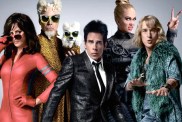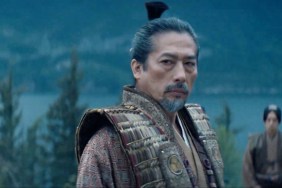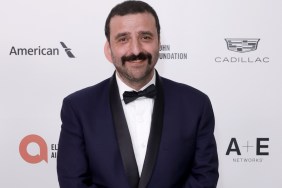Don Cheadle has starred in many great movies and played many great roles, and in Talk to Me, he plays another real-life person, one Ralph Waldo “Petey” Greene Jr., who went from being a convict in jail to a prominent radio DJ to becoming the voice of the black community in Washington, D.C. at a time when the civil rights movement had lost one of its great leaders, Dr. Martin Luther King, Jr. Petey chose a different way to band people together, often saying things that pissed people off, both black and white, and yet he made such a mark on the times, especially on morning talk radio even having given the controversial shock jock Howard Stern some early air time. (Stern has been a long-time fan of Greene’s M.O, while following a similar path from radio to TV.)
You really can’t get a better spokesperson for your movie than Don Cheadle, who as ComingSoon.net has learned form past interviews, is just as funny and outspoken as Greene was in his time and rarely afraid to say what’s on his mind or what he feels needs to be said.
ComingSoon.net: How did this project come to you?
Don Cheadle: You know, I first heard of this project many, many years ago, from Ted Demme actually. He had been trying to get this thing put together even before “Life” I think or maybe around that same time. Then it went through a bunch of permutations and different people, and Kasi Lemmons, it washed up on her shore, I think first to do a rewrite and then she actually wanted to direct it. Like I said, it almost fell apart two or three times.
CS: How familiar were you with Petey as far as his radio or TV show, and did you go back and watch or listen to a lot of it to get his mannerisms?
Cheadle: Yeah, I wasn’t familiar with him at all until I read the script, and it’s really tragic. All those tapes of his TV show are gone. All the radio shows, gone. There’s about five or six recordings and there’s some speeches he did, some public speaking that he did, and there’s something that he did on YouTube, “Petey Greene Shows How to Eat a Watermelon”, which is insane. You HAVE to see it, but other than that, all that archival stuff, unfortunately, that was a time when people didn’t save those tapes. Everything got taped over, so it’s all gone.
CS: Did you rely a lot more on the script and the research put into it, for instance the speech for Martin Luther King Jr. and things like that?
Cheadle: The script. Dewey Hughes was around, so he was a great touchstone, and people who knew Petey were around, but yeah, the actual footage of him and the actual tape of him are hard to come by.
CS: Can you talk about your process, particularly how you got that D.C. swagger?
Cheadle: I drank a lot. I don’t know if I got the D.C. swagger. I don’t know what I got. I just tried to be true to what the script dictated and followed the direction of Kasi Lemmons, my very talented director, and looked at a lot of archival footage, watched a lot of Watt Stax, that’s a great one to look at. Looked at the Petey stuff that I could. Listened to his tapes, talked to Dewey Hughes a lot, read articles about him, but you know, at some point, you have to make that transition into owning it and going, “Okay, now I’m going to take all of that work and try and somehow try and funnel it through my perspective and be this guy.”
CS: Some would say he was one of the original black shock jocks. Would you say that he was a factor on some of the modern-day morning shock jocks like Howard Stern?
Cheadle: Well, he actually had Howard Stern on his show early, and it pissed off a lot of people, but that was true Petey. He was like, “Who’s sayin’ the most outrageous stuff right now? Oh, him? Put ‘im on my show.” He really had an eye for people who were on the cutting edge and he started a lot of people, but he was also very
I love how non-PC he was, and I think he definitely was the precursor to the shock jock. He would say things that were just outrageous, even on his TV show. Really, how can you get away with saying that? You have to watch this “How to Eat Watermelon.” It’s brilliant. It’s so far over the top.

CS: How much was worked out in rehearsal and how much were you allowed to go off the script in terms of ad-libbing?
Cheadle: We didn’t do a lot of ad-libbing. The script was very well crafted and very tight and moved in a straight line. It was a really strong piece of writing. When you have something like that, you don’t want to start playing with it too much. You pull out one thread and the whole thing comes apart, so there wasn’t a lot of improv, but Kasi was very open to us bringing ideas and working things.
CS: How was your approach different than Chiwetel’s and how did you work together with him on your scenes?
Cheadle: Chiwetel is a terrible actor (laughter). I mean, he would try to get me to do his approach, but it involved a lot of shamanism
(laughter) no, no, Chiwetel, he’s a stellar actor and I wish I would have gotten over to London to see his “Seagull” ’cause I hear it’s just crazy and I know he’s about to do “Othello” with Ewan McGregor, and I’m sure that’s going to be amazing, too. Our processes are actually very similar. I mean, we both have a theatre background and we both kind of approach the work
there were several scenes in the film when it would be headed one way and he and I would kind of look at each other and go, “Didn’t you think it was going to go
?” “Yeah” and we’d pull Kasi aside and go, “Can we try it this way?” Our processes I thought were very similar and we approached it from a very collaborative place, but that’s a testament I think to coming up in that way. For the most part, if you’re open to that process when you come up as a theatre actor, it’s very much about working with a group and figuring out what the animal is altogether.
CS: How about Taraji? I’m not really that knowledgeable about her background.
Cheadle: She’s a hack. (laughter) She’s a theatre brat, too, She came from theatre school. Everybody had a very
we were all trained and we all tried to break down the script and understand the scenes in the same way.
CS: What are three lessons that you learned from Petey?
Cheadle: Three lessons that I learned from Petey from doing the movie? Well, I took a lot of the clothes. (laughter) I don’t know if that’s a lesson. I don’t know that I can reduce it to three lessons. I just know that I really appreciated the fact that he seemed to be somebody who spoke his mind and whatever the consequences might be, he said whatever he thought.
CS: Do you have a favorite “Peteyism”?
Cheadle: Go watch that tape.. that’s Petey Greene. That’s some classic over-the-top social commentary in a way that is vaudevillian almost and so theatrical. I know a lot of people who’ve seen that little piece that look at him doing that and it just pisses them off, but watch it carefully and listen to what he’s sayin’. He’s really, in my opinion anyway, purposefully poking at that stuff in people and thumbing people and saying, “Look at that. How do you really feel about that, black people? What is that really saying about you? Do you think this is defining you? Do you think this is who you really are because somebody else said that about you? Is that what you think? Now you don’t like watermelon because somebody said that makes you ignorant or something?” I mean, the social commentary is really something else.
CS: That was something from his show?
Cheadle: Yeah, that was from his show, “Petey Greene’s Washington.”
CS: If you could channel Petey and speak out to the American government and to the people about Darfur, what would you say?
Cheadle: About both of the things? Well, they’re two different things. I think the American government, I think he would say “Stop bullsh*tin’, stop lyin’ about everything,” but about Darfur, I don’t know. I don’t know that he would say anything much different than what the people who are active on it are saying now, which is, “We have to do something. We should do something.” If we want to hold ourselves up as being the moral power in the world, then as a superpower, we have to lead by example and do more to work with the international community to see an end to this. And reallyI’ve totally segued into Don nowbut I can’t do it as Petey because I don’t know what he would say about Darfur, but really, our country is one of the best informed about the issue and one of the most active I think in the world about it, but still, we need to encourage and support working with the United Nations and the security council in a more international way to deal with this problem.

CS: Do you see anyone today taking the role that Petey had in his day in speaking for the black community as a whole?
Cheadle: I think with there being so many media outlets and so many ancillary outlets where people have to plug stuff in, it’s hard to focus on one person, and I don’t know if anyone’s really stepped up to the plate and kind of taken that on. I think what we see when people most of the time when they get into that spotlight, they start dulling the edges a little bit and try to become more centrist to reach the widest base, which very often, just turns you into milquetoast and people can write you off. Petey never wanted that, and Petey never wanted the fame of being an international or even national star. He liked being the “voice of D.C.” quote-unquote and was fine with that audience. Those were the people he felt knew him and that he knew, and that’s what he wanted. I mean, it’s a tall order to try and speak “for the people” quote-unquote.
CS: It’s funny, because there’s a lot of people who try like Jesse Jackson or Al Sharpton, but it’s always very divisive when politics become involved, so it’s a shame that there’s someone who can’t go out there and do something that’s selfless and not politically-driven.
Cheadle: Also, it’s so fractious over the issues. What’s the thing you’re going to talk about? Immigration? Terrorism? Standing up for the victims of Katrina, which sort of ripped off the face off the veneer of America’s ideals and showed that we have this true underclass and a real problem with regards to how we deal with people who are just surviving on the menial ways in this country. So I don’t know what is that person going to stand up and say and what role would they be? Would they be the President? And if they were someone who was not the President, would they live? You know what I mean? The example of the ’60s was pretty much that you get that many people moving in that one direction, you end up with a bullet in your head, so I think that sort of shock, people of my generation have never gotten over that necessarily what our parents went through, and the generation after us don’t seem to really be focused on how to change things. I think we’ll come up against it, where we’re going to have to be, but it will probably be because of the impacts of what’s happening globally. It won’t be because of something in our country.
CS: Every time we’ve talked to you, you’ve been on the verge of directing a movie yourself. You were going to adapt Elmore Leonard’s “Tishomingo Blues” and now this Miles Davis biopic. Are you getting more comfortable and ready to jump into that?
Cheadle: I’ve always been ready. They just haven’t come down. Things happen, and it takes three to five years to get any movie off the ground traditionally. That’s the standard time it takes. Hopefully we’ll be in production on Miles Davis next year, but again, this is the business. We have to get the script up there and get it approved. We’ve found a home and if everything works great, then we have a studio and we just go.
CS: Are you learning how to play trumpet for that?
Cheadle: I have started to play trumpet and surprisingly, I can play the trumpet. It’s wild.
CS: Are you as good as Miles yet?
Cheadle: No
nah
I can play “Taps” but not like Miles would have played “Taps.”
CS: Have you met or played with any of his former back-up musicians?
Cheadle: Yeah, I met a lot of them, even before this had begun, but yeah, I saw Miles in the ’80s and saw the S.O.P. after they came out with Wynton and Brandford (Marsalis) when it was still Ron Carter and Tony Williams and Herbie Hancock. I met all those guys, so yeah, it’s something that’s been a part of my life, the music anyway, for a long, long time. I played sax for twelve years. That was my instrument.
CS: And what’s going on with “Tishomingo Blues”?
Cheadle: “Tishomingo” is dead
(illustrates by shooting a fake gun into the floor) BANG! BANG!
CS: I heard you were going to play another real life person in a Danny Glover film
Cheadle: (responds by shooting a fake gun into the floor) BANG! BANG!

CS: What compels you to play real-life people? Do you find it more challenging?
Cheadle: No, I don’t have a preference for portraying real people. In fact, I’d rather not portray real-life people. I think often when you’re hampered by the details of someone’s real history, it sometimes doesn’t make for the best story. They just happen to be the films that came along that the scripts were really good, and that got greenlit. It’s a very mercurial business. People often ask, “Why did you choose that?” Trust me, I’ve chosen a lot of movies that have not happened, and sometimes, the best thing that comes across the transom for you is just what it is. It just so happened that I read “Crash” and “Hotel Rwanda” in the same month of each other and they both got made. I also read five other scripts that did not get made. This is a script, like I said, that I first heard about ten years ago, and it’s taken a long time to get it to this place where it’s done, so it looks like, “Oh, Don Cheadle, he has a preference toward these films” but that’s not the way it is at all. And the Miles Davis thing in fact was something that I first heard about over ten years ago. It just happened that the timing now is at a place where I’m able to get a movie greenlit. I can get a budget made for a movie, so I was able to get them made.
CS: Do you miss the indie days of when you were a little more under the radar as a character actor? These days, any movie you’re in is automatically “A Don Cheadle Movie.”
Cheadle: I still feel like I am that. I don’t feel any different by that ’cause I can’t sit outside of me and look at the perspective of how am I being taken right now.
CS: But you do tend to get top billing in your movies.
Cheadle: That’s contractual. (laughter) That’s more about mutual pimpage. When I did “Crash”
when that came to me and I met with Paul Haggis, they couldn’t get it made and they were trying to get made, and I met with him and he said, “I don’t know what part you want to play,” and I said, “I’ll play any part in it or I’ll be nobody in it and just try to produce it and help you get it made” because I really believed in the material and that’s really what it’s about. I see this piece and I thought this would be great. At one point, I was going to play Dewey. It’s just whatever it takes to get this piece made because there are so few and so rare, especially coming out of this country, where you see a movie where you’re saying “I gotta see that.” It’s very rare that is just something you can just jump up and down about and as the business gets ever more corporate, it becomes more and more difficult to find pieces that you can rally behind. I don’t care what size the movie is. If I really believe in it and I think the part is something I want to do, then I’ll do it.
CS: Since you’re doing a lot more producing, are you trying to segue out of acting?
Cheadle: You know, I would really like to produce a movie that I’m not in. That would be great, to just put it out there and not have to be in front of the camera to get it made. I have two young daughters, and the challenges of having a career as an actor and going on location and being away and wrestling with, “is it right to take them out of school? Or we have to schedule it in summer so they’re out of school, and even if they’re out of school, do they want to be on the set in Morocco for a month?” You know what I mean? There’s a lot of things to consider doing this business, so yeah, I think the best career would probably just be a writing career and not even be in movies until they’re 18 or 19 years old.
Talk to Me opens in select cities on Friday, July 13.









